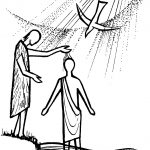This Week’s Liturgy Calendar.
The Season of Christmas.
Sunday 13th January: The Feast of the Baptism of the Lord.
Today, the Christmas season ends as we celebrate the Feast of the Baptism of Our Lord. In a way, we continue the theme of last Sunday’s feast of the Epiphany by continuing to focus on Jesus making himself known to all peoples. Today we hear God’s words over the waters of the Jordan: ‘You are my Son, the Beloved, my favour rests on you.’ As Christians, we believe that God’s words are meant for all who have been baptized. We are God’s children, children in whom he should be well pleased. It is fitting us to reflect on our own Baptism – the beginning of our Christian journey.
Beginning of the Ordinary Season of the Year (1)
Monday 14th January: Monday of week 1 of the Year
The Letter to the Hebrews provides our first reading on ordinary days for the first four weeks of this season in the Church’s liturgical cycle. It is suggested that it was written around the year 80 a.d. It is a complex theological work whose central theme is the priesthood of Christ. The unknown author uses Jewish categories that would still have been understood by the first century converts.
It begins with a powerful introduction. God sent his Son into the world. He made his great sacrifice and purified humanity and has now taken his seat at the right hand of glory. In the past portions of God’s plan had been revealed but now all is revealed.
The Gospel passages come from Mark and today we read of the launch of Jesus’ public ministry. He calls the first of his disciples.
Tuesday 15th January: Tuesday of week 1 of the year.
The author reminds us that, because of sin, we do not realise our full potential. We are subject to the world in many ways. Christ comes into this situation so that by his life death and resurrection he might make us what we were meant to be.
For the first nine weeks of the Ordinary Season, the Gospel reading comes from the Gospel of Mark. Jesus and his preaching have started to make an impression. This is because he teaches with authority, an authority that can overcome Satan.
Wednesday 16th January: Wednesday of week 1 of the year.
Today’s reading introduces the central theme of the Letter to the Hebrews – the priesthood of Christ. He is the perfect mediator because he is true God and true man.
Jesus heals Simon Peter’s mother-in-law and then goes on to cure others who are ill. Afterwards, he goes off to a quiet place to pray, refusing to allow the adulation of the crowds to dominate.
Thursday 17th January: Memorial of St. Anthony of Egypt.
St. Anthony was born in Egypt about 251 and died in 356. He is regarded by many as the originator of the monastic way of life. He gave up all his possessions and went to live in the desert as a hermit in various parts of Egypt but disciples gathered around him and he founded a number of monasteries, gatherings of scattered cells.
Friday 18th January: Weekday of week 1 of the year.
If you do not harden your heart, you will enter into the Kingdom of God, the new Promised Land. We must make sure therefore, it is woven into the very fabric of our being and living.
Jesus wasn’t only interested in healing the physical needs of the people. There was a spiritual message to be learned. We hear of the value of faith and Jesus’ power to forgive sin. No ordinary person could have that power.
Saturday 19th January: Saturday of week 1 of the year.
The Word of God is alive and active, the author of the Letter to the Hebrews reminds us. It is effective and penetrates into our hearts, into the very fibre of our being. This is our faith, a faith through which Jesus is with us, feeling our weaknesses with us.
The passage from the Gospel today is a comforting and consoling one. Jesus did not come to help those who believe that they are spiritually healthy. He came to help those struggling and genuinely trying to overcome sin in their lives.
The light of God surrounds us;
The love of God enfolds us
The power of God protects us;
The presence of God watches over us;
Wherever we are,
God is,
And all is well.

Comments are closed